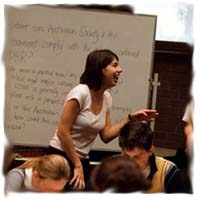UDHR University Summit
 by Year 11 Students
by Year 11 Students
Australia
From Wednesday 30 September to Friday 2 October, 1998 103 Year 11 secondary students from all over Australia attended The University of Melbourne UniSummit 98 to discuss the Universal Declaration of Human Rights. Following are comments and conclusions made by some of the Australian student delegates during their three days deliberation on the Universal Declaration of Human Rights.
At the outset of the summit one group of students, The Swans (Glyn Stuckey, Xian-Zhen Mah, Thomas Hughes, Catherine Wyllie, Ranmali de Mel, Ruth Page, Simon Wilkins, Steven Prince, Alice Carvalho, Surya Palani, Rachel Sonego and Tamara Jones. Group Facilitators Mai Mai Go and Ronny Andayani.), came up with a list of expectations of what they hoped to achieve not only over three days of the summit but also as a result of learning more about the Universal Declaration of Human Rights:
THE SWANS EXPECTATION CHECK
About the Universal Declaration of Human Rights: use knowledge to help others understand their human rights; broaden my knowledge of UDHR; gain better / greater understanding of UDHR; meet new people; discuss issues relating to youth; know more about the effects of UDHR on people; learn more about human rights; gain a better understanding of the abuses of the UDHR, particularly in Australia; discover what can be done by us to aid in trying to remedy these abuses; be aware of the hardships people face due to violations of the UDHR in their countries; take back to my school new ideas with regard to the UDHR and new ways to make people more aware; research more on human rights; learn how I can be more involved in helping uphold the UDHR; find out what I can do to help people whose human rights were violated
The Avengers (Catherine Rollison, Brianna Belot, Zoe Williamson, Tim Rowe, Ryan Louwen-Skovdam, Jane Lunt, Philippa Crimmins, Simone Edwards, Sharpley Hsieh, Michelle Gerstman and Steven Kambouris. Group Facilitator Lisa White.) examined Article 14 of the UDHR. They came up with some very powerful images of what it can be like to find yourself a refugee in Australia:
- Imagine finding yourself locked up in prison for no reason at all. This is a scenario that faces the countless refugees who seek asylum in Australia when they are placed in a detention centre. Inside Detention Centres there are steel barred windows, lino floors and security cameras mounted in every corridor. The refugees are locked up in their crowded dorms until breakfast, then locked in another room for breakfast then into another room where they spend the entire day watching TV. At 11 PM, they are taken back into their dorms. There is very little communication between people; they do not speak the same languages. These people are not dangerous; they are simply waiting for the chance to live somewhere safe.
The human cost for the detainees is apparent in the symptoms of mental distress they experience, such as depression, psychotic episodes, self-harm and suicide attempts. - We all thought about suicide - said Leang, a Vietnamese refugee. In July 1995, 18 people were restrained and handcuffed after a mass suicide attempt at the Port Hedland detention centre. They were placed in isolation after slashing their wrists with razor blades and 3 of them were - chemically restrained - by intra-muscular injection.Refugees fleeing to Australia can be considered - Unlucky voyagers to the Lucky Country.
Prior to receiving article 14 to study at UniSummit, we were not very knowledgable about asylum seekers. More to the point, we were unaware that our Government was not fully complying with an article in the Universal Declaration of Human Rights in our treatment of refugees.We hope you have too have learnt a bit about this important topic and hope you will continue an interest in the future.
Verbose (Astrid Haban-Beer, Peter Gurney, Anna Tynan, Merowyn Olaver, Martin Cuddihy, Meredith Stone, Fiona Lathleiff, Amanda Seiffert, Paul Hubbard, Anna Lyons, Kim Williamson and Leigh Wiegard, Group Facilitators Lee Cath and Kylie Evans) examined Article 19 which deals with freedom of speech. They found it was integral to the maintenance of all other rights.
- Freedom of speech is the vehicle which fosters individuality. An absence of freedom of expression severely restricts creative thinking and creative responses to problems. Freedom of expression encourages open debate and argument, which in turn reduces our complacency as we feel compelled to respond to issues. Perhaps most importantly, if our freedom of speech is denied, all other human rights can be taken away without protest. It is also fundamental to our democratic society, which cannot exist without freedom of speech.
The Nelsons (Alice Muhlebach, Matthew McKenna, Teniqua Crawford, Laura Waterhouse, Martin Keetels, Thea Lavery, Anitha Chakravarth, Paul Hesse, Dee Senaratne, Micarla Sexton and Natalie Robinson. Group Facilitator Sally Cowling.) examined article 25 of the Universal Declaration in particular the section relating to help and support for the unemployed. Following are some of their proposals on how both the Government and the Community can improve this support:
Responsibilities of Government:
Job Creation (cut taxes on private sector, incentives for small business, lower minimum wage)
Training (support and finding for education, multi-skilling long term benefits)
Responsibilities of the Community / Ourselves: change attitude towards so called -dole bludgers support: programs in local community centers; work experience for the unemployed; training schemes in industry; encourage mutual respect between government and the people (example: Do you work harder for a teacher you like and respect?)
Act! Become an active member in society. (Make you and your representatives work for the future good of society)
These strategies can only be successful if the government and community work in conjunction with each other.
Submitted at 1:29pm 10th Dec, 1998

|